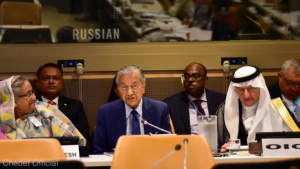at the side event in conjunction with the 74th United Nations General Assembly, New York
25 September 2019
2. Let us start by calling a spade, a spade. What happened in the Rakhine State is genocide.
3. What took place were mass killings, systematic rape and other gross violations of human rights. This resulted in Rohingyas fleeing the country en masse. Most ended up in Cox’s Bazar. On this, we commend Bangladesh for all it has done in hosting more than 1.2 million Rohingya refugees.
4. While Myanmar is arguing that it was responding to the threat of terrorism, it is ironic that millions fled in fear of such counter-terrorism measures or simply State and institutionalised terrorism.
5. Many faced untold brutality and were even at risk of seeing an entire generation wiped out. Some were able to escape but these lucky ones are now unable to return to their homes in Myanmar.
6. One thing is clear; the longer the refugees stay in the camps, the more desperate their situation becomes. As it is, the refugees have become vulnerable to other forms of exploitation. They become likely targets for cross border crimes such as human trafficking and sex slavery, among others. In other words, they can only see a bleak future ahead.
7. The situation in Myanmar is not any better. Many Rohingyas have become internally-displaced persons (IDPs) languishing in camps in Rakhine. When the world likened the IDP camps to those notorious concentration camps of the past, the Myanmar Government has been quick to deny. Yet, the Myanmar authorities have denied access to some UN officials and humanitarian aid workers. If Myanmar has nothing to hide, why bar others from seeing the situation in Rakhine? Let these officials and aid workers visit, inspect and assist those living in the camps.
8. Myanmar should demonstrate that it is serious in alleviating the crisis. In doing so, repatriation should be the main priority. Two attempts have been made to repatriate some of the refugees. Both have failed. Reasons for this are obvious. No one would return if they do not feel that their safety is guaranteed. On this, Malaysia will continue to insist that repatriation be done in a safe, voluntary and dignified manner.
9. This can only be done by granting full citizenship to the Rohingyas. However, the Myanmar authorities have manipulated the Rohingya issue to incite fear, hatred and violence. Thus, merely considering the idea of granting citizenship is unacceptable.
10. It is obvious that Myanmar’s attempt on ensuring accountability has failed. How would such attempts work if the perpetrators responsible for the atrocities are part of the system? As it is, none of the atrocities committed in 2017 have been accounted for. Even those convicted for the Inn Dinn mass killings, for example, were released after serving barely one year of their 10-year sentence. The conviction was an attempt to deceive us into thinking that they are holding perpetrators accountable.
11. It is clear that the Myanmar Government is unwilling to take any action to resolve the crisis. Therefore, it is left up to us – the international community, to do something about the situation. For a start, the UN should play its role, taking into account that it was established in hopes of preventing future human-made miseries. Its silence is deafening.
12. Without Security Council action, others must do their part to resolve the crisis and bring perpetrators to justice. We commend the positive effort of the OIC in addressing the Rohingya issue at the international fora and for the decision to bring the matter to the International Court of Justice. We hope other countries would support the OIC to ensure that the perpetrators do not get away with the heinous crimes that they have committed.
13. Malaysia, on our part, has also tried to do all it can. Apart from rendering humanitarian assistance, Malaysia is operating a field hospital in Cox’s Bazar. We are also hosting close to 100,000 registered Rohingya refugees. There are many more unregistered. While this may seem like a small number compared to those in Bangladesh, plenty of resources have been dedicated to allow them a decent life while they await relocation to a third country. We will continue to help the Rohingyas within our means and capacity.
14. Malaysia has done and will continue to do what it can. Nevertheless, we hope others would also join us and Bangladesh in our resolve to end the miseries that have befallen the Rohingyas. We need to put an end to the crisis and we need to do it now.





